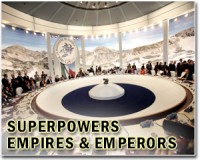| . |  |
. |
Washington (AFP) Feb 9, 2010 President Barack Obama's administration Tuesday denied a row over the US anti-missile shield was slowing a landmark nuclear treaty with Moscow, after days of sharp Russian criticism of NATO. Obama also pointedly contrasted Russia's "forward leaning" approach to confronting Iran's nuclear drive with China's more ambivalent stance, as Washington sought "significant" new sanctions against the Islamic Republic. A year after taking office, Obama is hoping that a replacement for the expired Strategic Arms Reduction Treaty (START) and Moscow's cooperation on Iran will validate his decision to "reset" US relations with Russia. But on Tuesday, General Nikolai Makarov, chief of staff of the Russian armed forces, raised eyebrows in Washington by saying the START talks, which have dragged past several deadlines, were stuck on the anti-missile issue. Moscow has reportedly insisted that any new pact regulates both strategic offensive missiles and the anti-missile systems designed to thwart them, a linkage that the United States has never favored. "The development and deployment of missile defenses is aimed against the Russian Federation," Makarov was quoted as saying by domestic news agencies. "The development of these missile defense systems without question weakens our potential nuclear deterrent." Both the State Department and the White House attempted to downplay the notions of new divides between the two former Cold War foes, and suggested that Obama was on the same page as Russian President Dmitry Medvedev. "The emerging missile defense architecture in Europe is not aimed at Russia, but rather the emerging threat from Iran," said State Department spokesman Philip Crowley. "We continue to discuss ways in which we can cooperate with Russia on missile defense." White House spokesman Robert Gibbs denied that the reconfigured US missile shield in Europe was in any way aimed at Russia, and said it was not complicating the final drive towards a START treaty. "When President Obama talked to President Medvedev a couple of weeks ago, President Medvedev didn't bring this up as an obstacle," Gibbs said. "I think the notion that somehow this is in any way an impediment to what's going on with START is simply not true. It certainly wasn't what President Medvedev told President Obama." In September, Obama shelved plans -- fiercely opposed by Moscow -- to site elements of a US missile shield in Poland and the Czech Republic, a plan pursued by his predecessor, George W. Bush. Moscow initially welcomed Obama's decision but bristled after Romania said it, like fellow former eastern bloc states Poland and the Czech Republic, had agreed to host medium-range ballistic missile interceptors for the shield. The new exchanges over missile defense followed several sharp critiques from Moscow about NATO in recent days. Medvedev sparked surprise in the western alliance last week by signing a document listing among "chief outside military threats" the fact that NATO is attempting to "globalize its functions in contravention of international law." The document also cited attempts to bring the "military infrastructure of NATO members closer to Russian borders, including by expanding the bloc." On Tuesday, Nikolai Patrushev, the secretary of the Russian national security council warned that the NATO alliance represented a "threat and a fairly serious one" to Russia. Seeking to praise Russia, Obama told reporters on Tuesday that although he was unsure how China would respond to a UN Security Council effort to frame tough sanction on Iran, he was happy with Moscow. "One thing I'm pleased about is to see how forward-leaning the Russians have been on this issue," Obama said. Andrew Kuchins, director of the Russia program at the Center for Strategic and International Studies in Washington, said the imminence of the START agreement, expected within months, was driving domestic suspicion of the United States in Moscow. "There is a lot of opposition within the Russian government toward making a decision for a more positive, constructive security relationship with NATO and the United States," he said. "There is a fundamental ambivalence towards NATO and the West, and the (signing) of the treaty is one of those watershed moments that (bring) those differences to the surface."
Share This Article With Planet Earth
Related Links Learn about the Superpowers of the 21st Century at SpaceWar.com Learn about nuclear weapons doctrine and defense at SpaceWar.com
 Europe battles declining influence
Europe battles declining influenceBrussels (AFP) Feb 9, 2010 The European Union is hoping that its revamped leadership can reverse a decline in global influence, wary of being marginalised by the United States and emerging Asian powers such as China, experts said. In a speech to the European parliament Tuesday, where he won appproval for a new team of EU commissioners, Jose Manuel Barroso admitted there was a danger of European "insignificance" on the ... read more |
|
| The content herein, unless otherwise known to be public domain, are Copyright 1995-2010 - SpaceDaily. AFP and UPI Wire Stories are copyright Agence France-Presse and United Press International. ESA Portal Reports are copyright European Space Agency. All NASA sourced material is public domain. Additional copyrights may apply in whole or part to other bona fide parties. Advertising does not imply endorsement,agreement or approval of any opinions, statements or information provided by SpaceDaily on any Web page published or hosted by SpaceDaily. Privacy Statement |